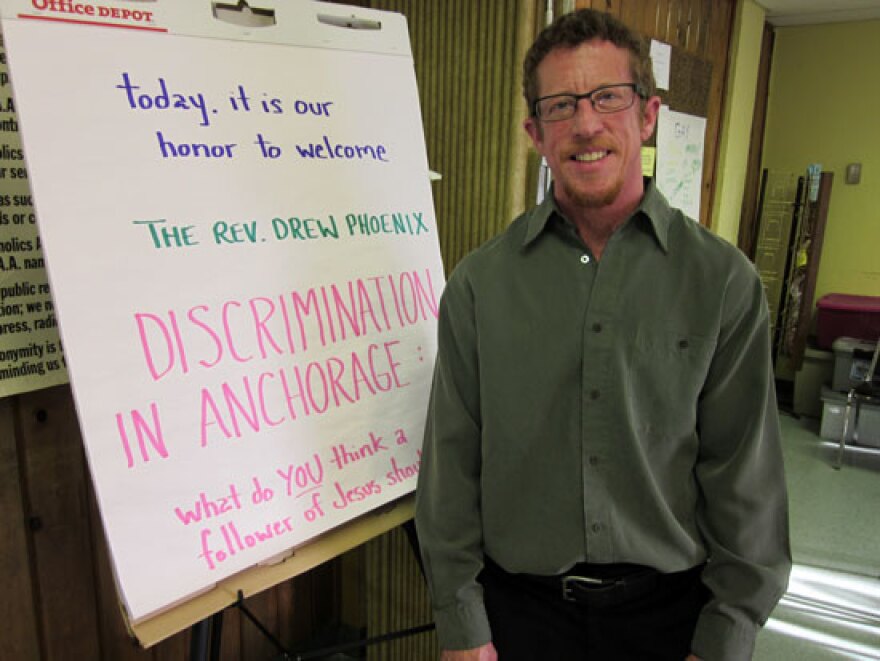The next Anchorage Municipal Election is set for April 3, and the most talked about measure on the ballot is Proposition 5. It aims to amend the city’s municipal code to add legal protections against discrimination on the basis of sexual orientation and transgender identity.
Today Drew Phoenix lives in a ranch style house in the Cheney Lake neighborhood on the East side of Anchorage.
“So here we are in the kitchen of our house. My girlfriend is a chef so we spend a lot of time in the kitchen, wonderful smells, amazing delicious food,” Phoenix said.
But finding a place to live wasn’t always so easy. The slim redhead, sporting black-rimmed glasses, khaki pants and button up shirt moved to Anchorage a few years ago to work at a non-profit. When he arrived he applied to rent several apartments.
“Each of the three times, I qualified in every way possible and then they found out about my being transgender and then the conversation stopped,” Phoenix said.
He says all three times it went the same way. He’d fill out the application, the manager would check his references, the landlords would do a credit check. There was no problem with his credit, and he thought he would get the place, until they said:
“They said ‘what’s this woman’s name doing in your credit history? The name Anne Gordon is on your credit history. And I said, ‘well, that’s me, I’m transgender. Now I’m Drew Phoenix.’ And at that point the whole … um … their whole attitude changed and they said, ‘well this isn’t gonna workout,’” Phoenix said.
People in favor of Proposition 5, say situations like Drew’s would be prevented if it passed. The Anchorage Equal Rights Initiative would change the municipal code to include protections for gay and transgender people. Protections already exist for race, color, sex, religion, national origin, marital status, age, physical disability and mental disability. It would exempt official religious organizations, but require adherence by employers and landlords renting 4 or more units. A similar ordinance passed the Anchorage Assembly in 2009, but was vetoed by Mayor Dan Sullivan. Such a law would give Phoenix a basis on which to file a complaint with the Anchorage Equal Rights Commission, and a lawsuit against the apartment complexes that rejected him.
And that’s exactly what those opposed to Prop 5 are worried about. Because they believe religious people – not just official organizations – should be allowed to decide who they do business with – from renting apartments to hiring employees.
“When law violates conscience, you have a major issue,” Shiloh Baptist Church Pastor Alonzo Patterson said.
Patterson is a black man who grew up in the segregated South and lived through the civil rights movement. But he says discriminating against gay and transgendered people is different.
“Gays say their civil rights are violated just like black civil rights are violated. They chose to become gay. I didn’t choose to become black, I was born that way,” Patterson said.
He says in many conservative Christians’ minds: “Sin is sin, based upon God’s law. I don’t see the gay as something nasty out there, I really don’t. I see the gay the same as I see a prostitute who violates God’s law, same as I see any other personal behavior that violates God’s law,” Patterson said.
But not every religious organization in town is opposed to Prop 5. St. Mary’s Episcopal Church recently invited Phoenix to come tell his story to their congregation.
Besides being an activist for the transgender community, Phoenix is also an ordained United Methodist Minister and says faith plays a central role in his work and life. Pastor Michael Burke leads St. Mary’s church. He’s also a member of the pro prop 5 group Christians for Equality. The group includes more than 40 Christian pastors in Anchorage.
He says whether you think being gay or transsexual is against God’s laws in the public sphere, all people should be treated equally. He asked his parishioners to think about Jesus’ example.
“Think about what your responsibility and what your response to a call to equality might be in the next few weeks. It is time that the community have an opportunity to hear the blessing of an alternative Christian voice, people of deep faith who take their cues from the scriptures as followers of Jesus, to do as Jesus would have us do to speak out on equality and fairness for people,” Burke said.
Both sides are mounting big campaigns to bring people to the polls on April 3rd. Ordinances similar to the one Prop 5 would create exist in more than 150 U.S. cities and counties.

